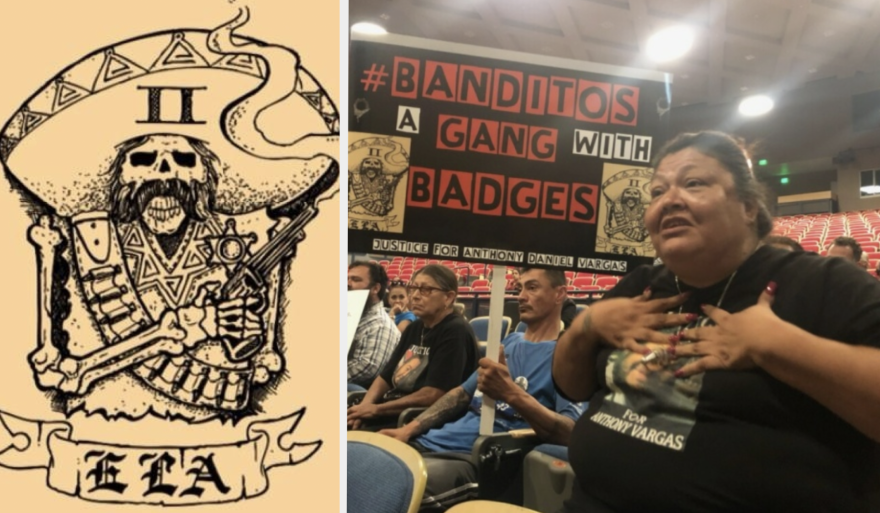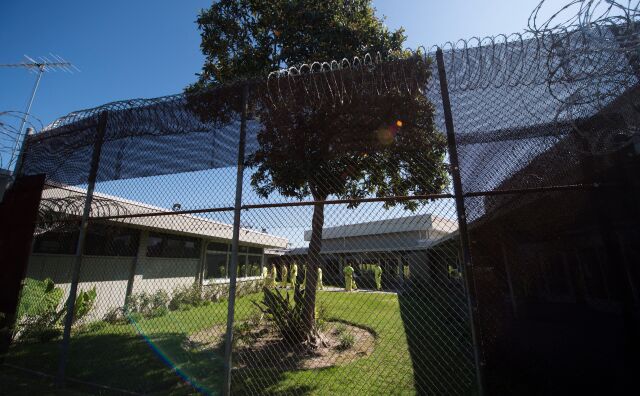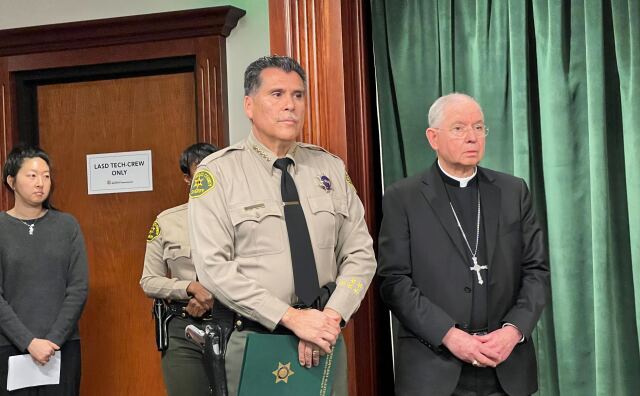In Scathing Report, Special Counsel Finds LA Sheriff Deputy Gangs Are A ‘Cancer’ On The Department

A special counsel appointed by the Sheriff Civilian Oversight Commission has issued a scathing report on deputy gangs inside the Sheriff’s Department, calling them a “cancer” that “must be excised.”
The report calls on Sheriff Robert Luna to adopt a policy that clearly prohibits deputies from participating in deputy gangs and “make clear that this is a top priority, and he should state his intention to make this happen immediately.”
At a public hearing Friday, the oversight panel voted to accept the report and forward it to the sheriff and the Board of Supervisors. “We have a willing partner in the new sheriff,” Commissioner Lael Rubin said, contrasting Luna with his predecessor, Alex Villanueva, who downplayed the issue.
Deputies who are part of gangs “valorize violence” by engaging in excessive force, celebrating deputy shootings, and creating “a climate of physical fear and professional retribution to those who would speak publicly about the misconduct of such groups,” according to the 70-page report.
The report followed an investigation that included a series of public hearings and interviews with 75 people, many of them deputies who testified secretly out of fear of retaliation by colleagues.
-
It's first in a series of strikes on UC campuses
-
Short film series uses modded video game
-
Understanding complexities and tips for navigating
New sheriff says he welcomes the scrutiny
When the commission initiated its investigation, former Sheriff Alex Villanueva dismissed it as a “kangaroo court” designed to harm his chances at reelection. Luna, who beat Villanueva in last November’s contest, welcomed the report.
Go deeper: Listen to our podcast on the rise and fall of now former L.A. Sheriff Alex Villanueva
“I want to thank the Civilian Oversight Commission for its report and diligent work on this important issue,” Luna said in a statement. He said his new Office of Constitutional Policing already “has been tasked with helping to eradicate Deputy gangs from this Department.”
The report says dangerous gangs or cliques, considered precursors to gangs, had existed in the department for at least 50 years and often have wrested control of patrol stations from sergeants, lieutenants and captains through intimidation.
The report says misconduct against colleagues and members of the public by these groups has cost the county millions of dollars in civil settlements and judgments.
A finding that deputy gangs 'valorize violence'

The report paints a bleak picture of deputy gangs within the LASD:
"Most troubling, they create rituals that valorize violence, such as recording all deputy involved shootings in an official book, celebrating with ‘shooting parties,’ and authorizing deputies who have shot a community member to add embellishments to their common gang tattoos. Typically, to be invited to become a member of a Deputy Gang or Deputy Clique, a deputy must demonstrate ‘toughness’ that is frequently associated with use of excessive force or other forms of unconstitutional policing.”
The report also says there are:
“At least a half dozen, and possibly more, Deputy Gangs and Deputy Cliques currently in the Department, primarily at patrol stations. They include the Executioners, the Banditos, the Regulators, the Spartans, the Gladiators, the Cowboys and the Reapers. There are reports that new Deputy Cliques are forming as members of existing Deputy Gangs and Deputy Cliques retire or otherwise leave the Department. There is some evidence indicating that Deputy Cliques are re-emerging in the Los Angeles County jails as the 4000 Boys.”
The report details allegations of misconduct at six patrol stations, including Compton, East L.A., South L.A., Century, Lancaster and Palmdale. Much of it has been previously reported.
Witnesses also told investigators about gang activity in the Aero Bureau, which oversees the department’s helicopter fleet:
“A witness interviewed by COC’s staff described systematic harassment by the three senior Caucasian deputies in the Aero Bureau. The witness described them as a ‘clique’ and the three as ‘shot callers.’ The witness said that there were no African Americans assigned to the Aero Bureau and that as far as the witness knew there had been only one African American ever assigned to the Bureau. Another witness, a current deputy with 20 years of service who insisted upon anonymity for fear of retribution, confirmed that the Aero Bureau takes pride in the “Ghetto Bird” logo. The witness said that a leader of the Aero Bureau openly stated that he was a Viking and was a founder of the Regulators. Another leader is a tattooed member of the Spartans.”
Other studies over the years have also highlighted the problem with deputy gangs. The issue came into sharper focus in 2019, when a group of deputies from the East L.A. Station filed a lawsuit accusing colleagues of engaging in misconduct. It said members of the Banditos gang assaulted deputies who did not go along.
It was unprecedented for so many deputies to break what has long been a code of silence around deputy gangs. The lawsuit is ongoing.
The deputies union is called an 'obstacle'
The report has a section entitled “Obstacles to Eliminating Deputy Cliques in the Department.” Among the obstacles it lists is the powerful Association of Los Angeles Deputy Sheriffs or ALADS, the union that represents rank and file deputies:
- The Special Counsel’s investigation revealed “numerous instances in which ALADS has protected Deputy Gang and Deputy Clique members,” the report states. It also says ALADS has opposed efforts by the department to require the disclosure of tattoos affiliated with deputy cliques.
- “ALADS also created obstacles to Special Counsel’s investigation. Those include making a baseless contention that the COC has no subpoena power because the grant of that power by Measure R violates the deputies’ collective bargaining agreement with the County. Further ALADS has contacted witnesses subpoenaed by the COC and urged them to seek specific lawyers to assist the witnesses in avoiding testimony.”
In an interview with LAist, lead Special Counsel Bert Deixler said, “this law enforcement agency, unless it undergoes cultural transformation, cannot be relied upon to properly and constitutionally police."
ALADS Vice President Richard Pippin said in a statement that the union does "not agree with the Commission’s mischaracterization of ALADS’ position on these issues, and we were disappointed to see there was no real attempt to take the kind of detailed, scientific approach we saw with the RAND study." (RAND’s 2020 survey of department employees found nearly one in six deputies said they had been asked at some point to join a subgroup, and that more than one out of three deputies and mid-level managers supported banning the groups.)
While stating that the union “does not condone behavior that is unlawful or intentionally violates the standards of modern professional policing,” Pippin noted ALADS’ “legal obligation” to “defend [its members'] rights under the law.” He added, “we do believe that, working together, there is a way forward to achieve common objectives without infringing on anyone’s rights.”
Pippin included a 2021 legal analysis written for the union by Southwestern Law School Professor John Tehranian that said “a ban on participation in subgroups … does not pass constitutional muster,” in part because it would violate deputies’ First Amendment right “to engage in expressive and associational activities as citizens acting outside of the scope of their official duties.”
Blame for DA's office and county counsel
The report also suggests county lawyers have played a role in supporting deputy gangs.
“The County Counsel has approved the use of County resources to pay by the hour litigation counsel to defend Deputy Gang and Deputy Clique members who have engaged in misconduct far outside the scope of their duties as deputies,” according to the report.
It says the DA’s office has played a role too:
“The District Attorney’s Office has in many instances ignored deputies who participate in Deputy Gangs and Deputy Cliques and who engage in gang-related misconduct. The [DA’s] Justice System Integrity Division (JSID) … investigates alleged criminal misconduct by deputies, as well as all deputy involved shootings to determine whether criminal charges should be filed … the JSID repeatedly refrains from pursuing evidence that a sheriff’s deputy accused of potential criminal activity … is affiliated with a Deputy Gang or Deputy Clique.”
The office of District Attorney George Gascón issued a statement welcoming the report. It said "any information we have regarding a deputy being affiliated in a gang is part of our robust discovery compliance system."
Recommendations
The report lists a series of recommendations.
Besides recommending Luna make it clear that deputies are prohibited from joining gangs, it calls for:
- Reporting known deputy gang members expected to testify in criminal cases to the district attorney and training supervisors “how to mentor deputies about the adverse consequences of involvement in Deputy Gangs and Deputy Cliques.”
- Providing support for sergeants from higher up in the chain of command in their efforts to enforce the prohibition on gangs.
- Rotating deputies among patrol stations more often. “The Department’s decentralized station-based structure has played a significant role in fostering Deputy Gangs and Deputy Cliques,” the report states. “Deputies’ loyalties are extended to the station rather than to the institution of the Department as a whole.”
'Scrubbing away years of grime'
The report is “scrubbing away years of grime and deliberate efforts to cover up this problem,” Commissioner Hans Johnson said at Friday's hearing. “Fifty years of denial, obfuscation, foot dragging, and stonewalling.”
Commissioner J.P. Harris, a former Sheriff’s lieutenant, said the report and its recommendations contained “some actionable information that’s going to be very hard for any public official to ignore.”
Families who believe they have been affected by deputy gang violence addressed the commission Friday.
“Thank you for the work that y'all are doing,” said Helen Jones, who alleges her son’s 2009 death inside Men’s Central Jail was the result of a beating by deputies. The department said he hanged himself.
Jones said she was skeptical the department could be reformed. “Giving them more training and all that, that’s not going to work,” she said.
Valerie Vargas, who claims her nephew was killed by members of the Banditos gang, said the report failed to address an important aspect of the problem. “What’s being missed is that these guys are moving up the ranks” to more senior positions, she said.
Former Undersheriff Paul Tanaka was an admitted member of the Vikings. He was convicted and sentenced to federal prison for obstruction of justice when he tried to cover up jailhouse abuses.
This story has been updated to include the responses of the DA's office and ALADS, and the information from Friday's Oversight Commission hearing.
Read the full report
-
In December 2020, Sadie and Eddie Martinez were falsely accused of attempted kidnapping by a white woman who had been shopping at a Michaels craft store at the same time as them. This is the story of Sadie's fight to clear their names and bring her accuser to justice.
-
An Orange County public defender has tallied 57 tainted criminal cases stemming from the county's informant scandal. New revelations of alleged misconduct could affect dozens more.
-
Ryan Clinkunbroomer was found in his patrol car near the Palmdale station. He was a third-generation sheriff's deputy.
-
L.A. County prosecutors say David Bloom scammed nine people out of nearly $250,000. Bloom, a twice-convicted con man known in the ‘80s as the “Wall Street Whiz Kid,” allegedly trolled for victims in a Hollywood apartment building and local bars.
-
Edward Bronstein died in March 2020 while officers were forcibly taking a blood sample after his detention.
-






